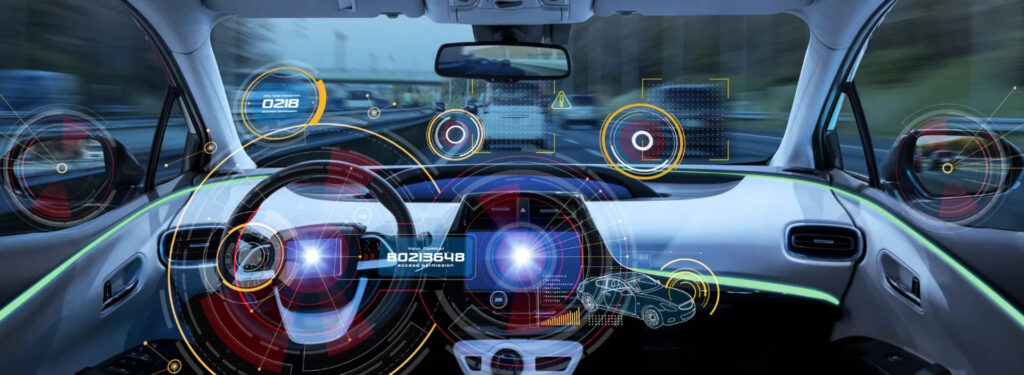The automotive world is changing at a breathtaking pace, and one of the key drivers of this transformation is artificial intelligence in automotive industry applications. From smarter safety features to improved manufacturing processes, AI in automotive is shaping how cars are designed, built, and driven. Today’s vehicles are not just machines; they are intelligent systems capable of learning, adapting, and interacting with their environment in real time.
How Artificial Intelligence Is Transforming Cars
When we think of artificial intelligence and cars, the first thing that often comes to mind is autonomous driving. But the scope of automotive artificial intelligence goes far beyond that. AI is used to power voice recognition, predictive maintenance, energy management in electric vehicles, and driver-assistance features that make daily driving safer and more efficient.
In modern vehicles, AI-enabled sensors and control units continuously monitor road conditions, driver behavior, and vehicle performance. This data is then analyzed to make quick decisions—whether it’s adjusting speed, applying brakes, or suggesting a safer route.
AI in Cars: Enhancing Safety and Comfort
One of the most visible applications of AI in cars is in advanced driver-assistance systems (ADAS). These systems rely on AI to interpret data from cameras, radars, and sensors to assist the driver. A popular example is adaptive cruise control—a feature that automatically adjusts your car’s speed to maintain a safe distance from the vehicle ahead.
Advanced versions of this technology, often called autonomous cruise control or smart cruise control, go a step further by predicting traffic flow and even bringing the car to a complete stop in heavy congestion. An autonomous cruise control system combines AI algorithms with real-time data processing to make highway driving smoother and less stressful.
These innovations are not just about comfort; they play a vital role in reducing accidents caused by human error. By responding faster than a human can, AI systems can help prevent collisions, warn drivers of hazards, and even take corrective actions when necessary.
Artificial Intelligence in Manufacturing and Design
Beyond the driving experience, artificial intelligence in automotive industry processes is also revolutionizing manufacturing and design. Car manufacturers use AI-driven analytics to improve assembly line efficiency, reduce defects, and forecast maintenance needs in machinery. AI tools help designers simulate vehicle aerodynamics, test virtual prototypes, and optimize materials for safety and durability—long before a physical car is built.
For example, AI can analyze thousands of design variables and suggest the most efficient layout for an electric vehicle’s battery system. It can also predict how components will perform over time, allowing engineers to make data-backed improvements before mass production.
AI and Predictive Maintenance
Another growing area is predictive maintenance, a concept that uses automotive artificial intelligence to keep vehicles in top condition. AI algorithms analyze data from sensors to detect early signs of wear or potential faults. Instead of waiting for a breakdown, the system notifies the driver or service center in advance, reducing unexpected failures and repair costs.
This approach not only extends the life of the vehicle but also enhances safety, as critical issues are identified before they lead to dangerous situations on the road.
The Future of Artificial Intelligence and Cars
The road ahead for artificial intelligence and cars is incredibly exciting. We are moving toward a world of autonomous cars that can handle complex traffic scenarios with minimal human intervention. Features like autonomous cruise control are just the beginning—future vehicles will use AI to communicate with other vehicles and infrastructure, creating a connected ecosystem that reduces congestion and emissions.
Smart cruise control systems will become more intelligent, adapting not only to traffic conditions but also to driver preferences, weather, and road types. Imagine a car that knows when you prefer a relaxed drive and when you need a more responsive mode, all powered by AI in automotive advancements.
In addition, AI is expected to play a major role in energy efficiency. For electric and hybrid vehicles, AI can manage power distribution, optimize charging schedules, and extend battery life. For logistics and fleet management, AI-driven route planning will help reduce fuel consumption and delivery times.
Challenges and Opportunities
Of course, the integration of automotive artificial intelligence also comes with challenges. Data privacy, cybersecurity, and the need for robust infrastructure are critical areas that need constant attention. Manufacturers and policymakers are working together to ensure that AI-powered systems are safe, transparent, and reliable.
Despite these challenges, the opportunities far outweigh the risks. AI has the potential to reduce road accidents, lower emissions, and provide a more enjoyable driving experience. As the technology matures, we can expect cars to become even more intuitive, learning from our habits and offering personalized features that enhance comfort and safety.
Conclusion
Artificial intelligence in the automotive industry is no longer a distant dream—it is here, shaping the vehicles we drive today and revolutionizing the ones we will drive tomorrow. From adaptive cruise control and smart cruise control to factory floors powered by automotive artificial intelligence, AI is driving innovation, efficiency, and sustainability at every level.
As we step into this new era, leading manufacturers are embracing AI to stay ahead of the curve. Suzuki India is actively integrating AI in cars and advanced connectivity features into its offerings. If you are looking for a brand that combines innovation, reliability, and cutting‑edge technology, Suzuki India is a great choice to experience the future of driving—smarter, safer, and more efficient.

